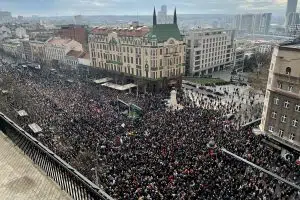Brussels – Viktor Orbán is not alone. The closest ally of Serbia’s Aleksandar Vučić, the prime minister who is creating the most problems for the unity of the 27 Member States – and the one who is getting the way of the introduction by Brussels of measures against Belgrade for not fulfilling commitments to normalize relations with Kosovo – is finding good company in the far-right array in the European Parliament. Destabilization, interference, attempts to recreate “a new Maidan”: These are the accusations launched by some members of the Identity and Democracy (Id) group not against Russia or China but against the European Union, after, the to say the least, controversial results of early elections in Serbia on December 17.

The insinuations put forward in particular by two French MEPs from theRassemblement National were undoubtedly the most sizzling note in this week’s debate at the plenary session of the EU Parliament in Strasbourg about the situation in Serbia after the December elections (the vote on the resolution is scheduled in the February session). All political groups, including the European Conservatives and Reformists, agreed that there were “grave irregularities and vote-buying” – as stated by Croatia’s Ladislav Ilčić (Ecr), albeit motivated by purely nationalistic reasons – and that “Serbian citizens deserve European reforms and concrete results” (Vladimír Bilčík, EPP), with a thinly veiled criticism of the Commission and Council on the “very soft reaction” to the need for “pragmatism in support of stabilocracy in the country, which, however, does not lead to the expected results” (Klemen Grošelj, Renew Europe). On a different note, French MEPs speaking in the Strasbourg hemicycle on behalf of the Id group expressed their dissent in a way that was more controversial than expected.
“Ideology motivates this debate, what is your problem? Vučić’s victory and the defeat of your political allies? Is that why the EU is trying to destabilize Serbia?” attacked French Jean-Lin Lacapelle (Id), accusing EU institutions of “meddling in Serbian politics, because every country is sovereign and independent, as long as its democratic choices please you.” Even more outspoken was compatriot Thierry Mariani: “I am concerned because this region needs reconciliation, while this debate will make the opposition continue to stir the pot.” Until the most sibylline closing: “I would like to understand the reason behind this discussion, push for a second Maidan?” The reference is to one of the factors that triggered the crisis between Russia and Ukraine in 2013, and Kyiv and Brussels consider the first expression of the people’s will to follow the European path for the country that is now invaded by the Russian army.
The words of the two far-right MEPs – and in particular the reference to the “second Maidan” in a negative sense – highlight not only the distorted view of EU-Serbian relations according to a specific part of the European political spectrum but also a wink to Vladimir Putin’s Russia that has never been disavowed (but became less explicit after the outbreak of the war in Ukraine). To speak of the “destabilization” of President Vučić’s system of power by EU institutions is misleading for two reasons. First, because it is not factual: Serbia is a candidate country for accession to the European Union, whose commitments enshrined in the EU Treaties (including respect for the principles of the rule of law called into question by the conduct of the last elections) have been voluntarily signed by Belgrade. Second, because — assuming there is a pattern of illicit pressure in Brussels against Serbia — the democratic mechanisms of the Union allow PM Orbán to oppose in the Council the introduction of the “temporary and reversible” measures that Brussels has been discussing for months (the same ones that as for Kosovo) despite the green light from all other member states.
Even more troubling is the view of the relationship in light of Russia’s role in the region. In particular, it is worth considering that Vučić’s Serbia is the only partner of the Union that reserves the right to non-alignment to the Common Foreign and Security Policy, especially on sanctions against Moscow for the invasion of Ukraine (not even in principle) and that to date has never wanted to stray too far from its ties with the Kremlin. On the contrary, despite receiving 165 million euros in an energy support package from Brussels in May 2022, Vučić signed an understanding with Putin for three years of Russian gas on favorable terms. For the Kremlin, Serbia is a kind of bridgehead in the Western Balkans, so much so that Brussels continues to raise concerns about possible Russian destabilization of the region after the armed attack on Ukraine. Speaking of Ukraine, it casts a disturbing light on the parallels drawn by the two Rassemblement National MEPs between Brussels’ support for the “legitimate street demonstrations” in Belgrade (as Justice Commissioner Didier Reynders called them) and the 2013 Euromaidan demonstrations. The not even too veiled criticism supporting the demands of the protesters – Serbs today as Ukrainians then – for greater electoral transparency and against violations of the rule of law is a potential sounding board for Kremlin propaganda that pro-European protests are the result of manipulation by Western powers and require more or less direct Russian intervention.
Tensions in Serbia after early elections
.

From left: the president of Serbia, Aleksandar Vučić, and the prime minister of Hungary, Viktor Orbán (credits: Andrej Isakovic / Afp)
Despite high expectations on the eve of the elections from the ‘Serbia Against Violence’ coalition, the Serbian Progressive Party won again with 46.67 percent of the vote, 23 percentage points ahead of the united opposition that came in second place. In the face of fraud and numerous illegal actions at the ballot box, thousands of people took to the streets responding to the call of the parties and movements that had translated into political (pro-European) demands the street protests against the climate that led to the May Shootout. The Organization for Security and Cooperation in Europe (OSCE)-led election observation mission – in which members of the European Parliament also participated – also noted “the misuse of public resources, the lack of separation between official functions and campaign activities, as well as intimidation and pressure on voters, including cases of vote-buying.” Nearly a month after the early elections, protests against fraud by the ruling party continue, particularly in Belgrade.
There, the situation remains tense and there could be a repeat of local elections, which the Serbian Progressive Party won. Pro-Russian Aleksandar Šapić, which leads the party in Belgrade, won 49 seats (out of 110), which, however, would not be enough to control the City Assembly with the support of the far-right Russophile nationalist party ‘We, the Voice of the People’ of Branimir Nestorović alone. The coalition ‘Serbia Against Violence’ denounced that over 40 thousand people who arrived from Republika Srpska (the Serb-majority entity of Bosnia and Herzegovina) had voted in Belgrade without being formally registered as residents and demanded the annulment of the ballot result, explicitly speaking of “electoral theft.” The same complaint came from MEP and member of the parliamentary delegation Viola von Cramon-Taubadel (Greens/Ale): “We have seen cases of organized transportation of voters from Republika Srpska and intimidation of voters.”

Serbian opposition street protests in Belgrade (credits: Miodrag Sovilj / Afp)
In addition, Brussels “is following closely” (according to Ana Pisonero, EU Commission’s spokeswoman for Neighborhood Policy and Enlargement) the violence suffered by the leader of the Republican Party, Nikola Sandulović, who was picked up by Serbian intelligence services on January 3 and severely beaten in detention for paying homage at the grave of Adem Jashari, one of the founders of the Kosovo Liberation Army (UCK). Members of the Serbian Security Information Agency (BIA) allegedly abducted and tortured Sandulović and detained him in Belgrade’s central prison without access to independent medical care. Milan Radoičić, deputy head of Lista Srpska (the main party representing the Serb minority in Kosovo and closely controlled by President Vučić), who, among other things, already admitted to organizing the armed attack in northern Kosovo in late September last year, was among those responsible for the violence. The former head of Serbian intelligence (who resigned two months ago), Aleksandar Vulin, reportedly personally ordered Sandulović’s arrest, but the defense lawyer pointed the finger at President Vučić.
Find more insights on the Balkan region in the newsletter BarBalcani hosted by Eunews
English version by the Translation Service of Withub






